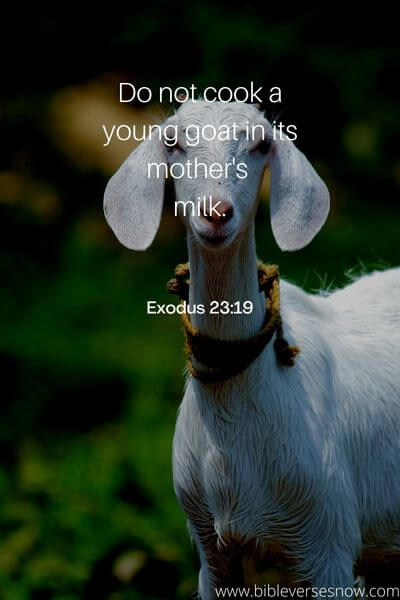In contemporary society, the ethical implications of killing animals are hotly debated. Within many religious frameworks, particularly Christianity, there exists a profound dialogue surrounding the moral ramifications of animal sacrifice and consumption. The Bible provides various perspectives, making it essential to examine how these narratives shape the understanding of animal life and its sanctity. Central to this discussion is the consideration of why killing an animal is often regarded as a sin and the various interpretations surrounding this issue.
To comprehend why animal killing is viewed as sinful, one must first delve into the theological principles that govern this belief. Biblical texts frequently emphasize the stewardship of creation. Humanity is seen not merely as a dominion over animals but as guardians of God’s creations, responsible for their welfare. Genesis 1:26 touches upon the notion of humans created in the image of God—indicating a distinct responsibility to protect and care for other life forms. This foundational assertion implicit in Genesis delineates a moral obligation: if humans hold dominion, they must exercise that authority compassionately, avoiding unnecessary pain and suffering inflicted upon sentient beings.
Furthermore, the concept of sacrifice emerges prominently in biblical narratives. The Old Testament frequently recounts animal sacrifices as integral to worship and atonement. However, these acts are typically contextualized within a covenant that necessitates respect and reverence for life. The act of sacrifice is not viewed as an arbitrary taking of life but rather as a solemn duty imbued with spiritual significance. The sacrificial lamb represents innocence, a willingness to bear sin—a poignant reminder that life is sacred and should not be taken lightly. Misinterpretation of these texts can lead to wrongful justification for animal cruelty, deviating from the intended reverence for life. Therefore, it’s crucial to discern that, in biblical terms, killing an animal for food or sacrifice should be approached with utmost seriousness and intentionality.
Transitioning to the thematic analysis found in the Bible, one can observe pivotal verses that advocate for compassion towards animals. Proverbs 12:10, for instance, states, “A righteous man cares for the needs of his animal.” This edict presents a direct moral imperative advocating for kindness and empathy towards all creatures that share our environment. The wisdom literature in the Bible embraces a holistic view of creation—indicating that cruelty towards animals not only reflects moral failing but an infringement upon divine commands that emphasize love and care across creation.
Moreover, the New Testament introduces a nuanced perspective on the sanctity of life, which further complicates the discourse surrounding animal killing. While Jesus frequently interacted with animals in his parables, He emphasized compassion and highlighted the value of all life. Matthew 10:29 states, “Are not two sparrows sold for a penny? Yet not one of them will fall to the ground apart from the will of your Father.” This verse indicates that not even the smallest of creatures is overlooked by God, thereby reinforcing the principle that animal lives bear inherent significance. In this light, a cavalier attitude towards killing animals is not merely unwise; it directly contradicts the spiritual principles laid out in Christian doctrine.
Readers exploring this topic through a biblical lens can expect to encounter rich theological discussions which elevate the moral frameworks guiding our interactions with animals. Many Christian scholars argue that an ethical diet—one in which slaughter and suffering are minimized—is a pathway to fulfill the divine mandate of stewardship. This ethical imperative resonates in modern debates about factory farming, where practices often lead to extensive suffering. Such discussions compel a reevaluation of how food is sourced and consumed, pushing advocates for animal rights to seek alternatives that align more closely with biblical values of compassion and care.
Additionally, the narrative of Noah in the Ark symbolizes divine protection over animals during times of catastrophic change. The preservation of species, despite the flood, signals a commitment to the continuation of life. This story serves as a reminder that animals play an irreplaceable role in the ecosystem and that their well-being is interconnected with human flourishing. The implication here is clear: disregarding this interconnectedness can lead to profound consequences—not just for the animals, but for humanity as well. Environmental degradation and loss of biodiversity speak to the repercussions of failing in our stewardship.
Moreover, the dialogue about animal ethics invites readers to contemplate their dietary choices and lifestyle. The idea of ‘sustainable eating’ emerges from biblical principles, advocating for a diet that is not only health-conscious but also rooted in respect for God’s creation. Christians seeking to align their actions with their beliefs realize that dietary choices should invoke compassion and sustainability. They align with a deeper understanding of humanity’s relationship with the earth, paving the way for a more compassionate existence.
Consequently, as theological discussions bore fruit in practical applications, it becomes clear that the question of killing animals transcends mere morality; it is interwoven into the very fabric of faith and identity. The awareness that life is precious permeates through scripture, reinforcing the notion that every action aligns us closer to or further from divine expectations. To kill an animal without contemplation or necessity is to take a step away from that divine design.
In conclusion, the exploration of why killing an animal is often seen as a sin within the biblical context reveals a complex interplay of stewardship, reverence, and moral obligation. Christian teachings call for an appreciation of the sanctity of life that transcends the simplistic view of animals as mere resources. By embracing open dialogue surrounding this topic, we can guide ourselves toward a more conscious and compassionate existence that aligns with the values inherent in biblical wisdom.








